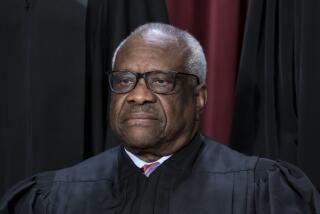SEC Agrees to Travel Restrictions; House Panel Ends 16-Month Probe
- Share via
WASHINGTON — Securities and Exchange Commission Chairman Arthur Levitt isn’t going to be taking first-class flights or staying in more expensive hotels for official business, under an agreement reached with House lawmakers, congressional aides said Thursday.
To put an end to a 16-month congressional investigation into Levitt’s travel practices over the last 3 1/2 years, the SEC in late May agreed to the reforms put forth by the House Committee on Government Reform and Oversight, according to documents obtained by Reuters.
“After 16 months, the commission determined that it was a distraction from its core mission of protecting investors and overseeing the markets,” said Christopher Ullman, a spokesman for the agency. “We felt that we had come to a genuine impasse.”
Lawmakers and aides involved in the travel probe say Levitt misused government-paid upgrades for flights and lodging to help cut his costs of upgrading even further to first-class airline seats and pricier hotels.
“It’s clear to me that taxpayers have been subsidizing Mr. Levitt’s first-class lifestyle,” said Rep. David McIntosh, the Indiana Republican who chairs the subcommittee on regulatory affairs that oversees the SEC and other independent agencies.
Committee staff members say Levitt’s practice was outside of government regulations. Further, aides said the SEC itself even bans first-class travel by any employees.
“The regulations as followed by the entire government were not followed by the SEC,” a committee aide said.
“It troubles me deeply that the chief regulator of the securities industry refuses to follow the government’s own regulations and SEC internal guidelines,” McIntosh said.
But the SEC’s Ullman defended Levitt’s travel practices and said they did not violate federal regulations or agency standards.
“The taxpayers throughout all of this paid only what was expected under the law, no more, no less,” Ullman said. “If the chairman or other people want to take out their own wallet and spend some money on an upgrade, it doesn’t affect the taxpayers at all.”
He said any suggestion that the chairman benefited from commission travel practices is “absolutely preposterous.”
Even so, the SEC agreed to tighter travel restrictions. It will also report regularly to the House panel on the quarterly audits beginning in 1998 that must be conducted by the inspector general’s office.
In addition, the agency has agreed to provide more thorough explanations for costly upgrades to business-class and pricier hotels.
More to Read
Sign up for Essential California
The most important California stories and recommendations in your inbox every morning.
You may occasionally receive promotional content from the Los Angeles Times.










